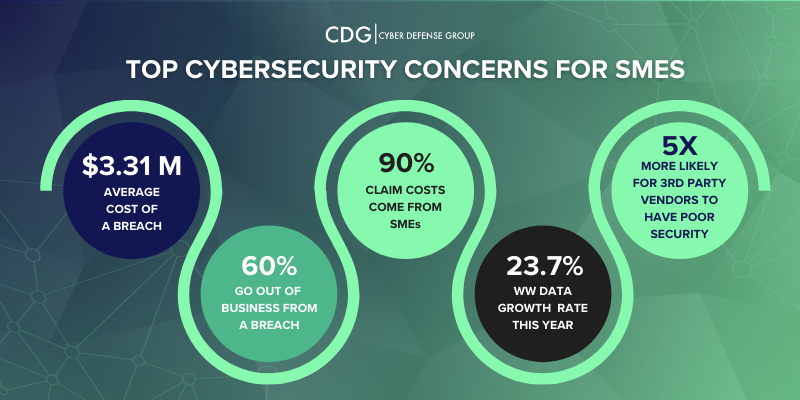Exploring the Security as a Service Market: Growth, Challenges, and Benefits for SME Businesses

Interested in the growing significance of security as a service for SME businesses? Well, perk your ears up, sit back, and grab a cup of joe as we dive into the latest trends and survival strategies for small and medium-sized enterprises (SMEs) in the ever-growing realm of cyber threats. In the context of a cloud computing environment, secure cloud infrastructure and the need for cybersecurity as a service are paramount. Here, you’ll hear an honest assessment of the challenges, growth drivers, and competitive landscape that SME’s face around cybersecurity today. Think of this article as the SME roadmap to this valuable market, where investing in a comprehensive security program is no longer optional…kind of like wearing a seat belt.
Key takeaways
- The cybersecurity as a service market is expected to experience significant growth, reaching an estimated USD 68.33 billion by 2031, driven by an increase in cyber threats and demand protection of sensitive data among SMEs, despite facing skilled workforce shortages and integration challenges.
- Cybersecurity for the cloud is becoming a critical facet in the cybersecurity portfolio, providing benefits like cost-effectiveness and scalability, but it also presents integration and regulatory compliance challenges that businesses need to navigate carefully. An integrated cloud solution offers a centralized view of all cyber activities, providing real-time visibility and ensuring consistent cyber policies.
- SMEs are increasingly adopting cybersecurity solutions due to the high costs associated with data breaches and the growing trend of cyberattacks targeting smaller businesses, highlighting a critical market need for affordable, effective cybersecurity services.
- Organizations are maturing their approach to cybersecurity as a service by engaging a security services provider for full-scope cybersecurity programs instead of playing whack-a-mole with technology products.
- Conducting a security assessment after cloud migration to ensure all security tools and measures meet industry standards.

A significant surge in the cybersecurity as a service market is occurring, underpinned by a rise in cyber threats and the adoption of cloud and virtualization technologies, along with a growing demand to protect sensitive data among SMEs especially those that are selling into large enterprises (F500). However, this growth is not without its challenges. These businesses face significant hurdles such as lack of a skilled workforce and difficulties knowing what to concentrate on.
So, what are the factors driving growth and how can businesses navigate the associated challenges? Let’s dig deeper.
Growth within the cybersecurity services market: Size and forecast
The cybersecurity as a service market is set for an impressive growth trajectory, with the market expected to reach a staggering revenue forecast of USD $500.70 billion by 2030, up from USD $222.66 billion today, according to Grand View Research. This growth is fueled by various factors, such as the increasing number of cyber-attacks reported by Cybersecurity Ventures, growing concerns about cybersecurity highlighted in IBM’s Cost of a Data Breach Report, and the rapid advancement of technology that leaves us vulnerable to new threats.
The need for a robust cybersecurity program becomes more critical as businesses continue to digitize their operations and utilize cloud services. With this momentum, the cybersecurity as a service market is poised to grow at a compound annual growth rate (CAGR) of 19%, promising significant growth prospects.
Key drivers and obstacles
While the growth prospects are promising, the road to market expansion and market growth in the global market is not devoid of hurdles. Factors propelling the service market size include heightened awareness of cybersecurity risks among mid-market businesses and an escalating threatscape, which together create a $2 trillion market opportunity for providers of cybersecurity technology and services. However, the market faces significant obstacles, including a shortage of skilled cybersecurity professionals and the importance of choosing a reliable cloud provider.
These challenges really make us pause and take a moment to reflect on the industry. It’s clear that we need to come up with innovative solutions and services to keep ahead of the constantly-evolving cyber threat landscape.
Currently, SMEs have limited options for protecting themselves against cyber attacks. Here are some of the more popular practices:
- Basic cyber protocols by throwing tools at IT – using rudimentary security tools such as firewalls, antivirus software, and basic employee training.
- Outsourcing to IT service providers or MSPs – MSPs are typically per-seat and don’t have the expertise or knowledge that pure-play cybersecurity service providers have.
- Delaying cybersecurity investment – There’s a “Chicken Little“ problem with cyber where there is so much bad news that many organizations throw their hands up and decide they could never be secure, so they leave their security strategy to chance – a very dangerous proposition.
Outsourced security solutions can help SMEs address these cybersecurity challenges by utilizing external providers to manage services like data loss prevention, antivirus management, and intrusion detection.
Additionally, the importance of network security protection for cloud applications cannot be overstated, especially in ensuring uptime and addressing vulnerabilities in off-net users and those connecting directly to cloud apps.
Key challenges for the security as a service market

In today’s cybersecurity scene, companies deal with big challenges that put their sensitive data and overall cybersecurity at risk. Attackers are now going after smaller businesses more, with SMEs potentially losing up to $3.31 million per data breach. This really highlights the need for strong cybersecurity. With larger enterprises keeping a closer eye on them, SMEs have to show solid security measures to partners and customers. The evolving demands for cyber insurance also mean SMEs need to prove they’ve got comprehensive cyber practices in place. And with data proliferation, managing data becomes tricky, making prevention of data loss super important. Misconfigurations and provisioning errors can lead to cloud data breaches, highlighting the importance of accountability and proper security measures. Security as a service, especially using AI-driven solutions, is becoming crucial for spotting advanced threats.
Attackers are moving downstream
The cost of a data breach can be devastating for SMEs. Given that the average cost of a data breach for SMEs with fewer than 500 employees can reach as high as $3.31 million, these businesses stand to lose more in the event of a cyberattack. Furthermore, attackers are increasingly targeting smaller businesses, making cybersecurity a critical investment for SMEs. Event management is pivotal for SMEs in identifying and tackling security issues by offering insight security posture and consolidating all cybersecurity service activities. Explore further.
Greater third-party scrutiny
Third-party scrutiny by large enterprises is another factor driving the need for cybersecurity among SMEs. With businesses needing to demonstrate robust cybersecurity measures to partners and customers, the pressure to maintain strong practices and have a demonstrable cybersecurity program is increasing.
Choosing a reliable service provider to provide cybersecurity is crucial to meet these third-party scrutiny requirements. Underscoring the value of these services to uphold business reputation and trust in today’s global economy.
Evolving cyber insurance demands
Cyber insurance requirements are another factor driving the need for cybersecurity among SMEs. Insurers are increasingly demanding evidence of strong cybersecurity practices, making cybersecurity as a service a critical part of meeting these requirements.
The proliferation of data and data loss prevention
Data sprawl presents a mounting challenge for SMEs as the management and protection of data, spread across various locations and formats, becomes increasingly complex. Security as a service offers a solution to handle data sprawl effectively and prevent data loss, safeguarding sensitive information for businesses.
AI-driven solutions
AI-driven solutions are making a significant impact in the security services market. AI is being leveraged for advanced threat detection and improving anomaly detection, helping understaffed organizations know what to pay attention to from a cyber perspective.
Such advancements are key players laying the groundwork for more effective and efficient cybersecurity solutions.
Benefits within the cybersecurity service market

Despite the challenges we face today in the land of cyber, security services offer a silver lining for SMEs. These businesses, often face some significant challenges and with the right provider, SMEs can gain confidence to secure their data and operations. Not only ensuring survival and success in world imploding with cyber threats, but allowing for innovation. Key benefits to an SME are:
- Cost-effective security solutions: Reduces the need for significant upfront investments in cybersecurity infrastructure.
- Expertise and broad skill access: Provides access to specialized knowledge and skills without hiring full-time staff.
- Flexibility and scalability: Easily scales with business growth and changing cybersecurity needs.
- Reduced in-house stress and effort: Outsourcing alleviates the burden on internal teams, reducing stress and effort associated with managing cybersecurity functions in-house.
- Compliance support: Helps meet regulatory and compliance requirements.
Benefits of using a managed security service provider
A managed security service provider is crucial for safeguarding SMEs’ data and operations, addressing challenges by providing expert, continuous protection and advanced solutions for protection that small businesses may not afford or handle internally. These providers offer services like threat detection and incident response to swiftly identify and mitigate breaches. They also bring specialized expertise and the latest technologies to help SMEs stay ahead of cyber threats. Outsourcing cybersecurity allows SMEs to focus on their core operations while receiving enhanced protection and tailored security solutions.
The future for security as a service
Looking towards the future, there’s certainly an exciting journey awaiting the security as a service market. Key factors that will shape the future of this industry include:
- Technological advancements: Rapid progress in areas like artificial intelligence, robotics, and automation is reshaping industries and enhancing efficiency.
- Market consolidation: Mergers and acquisitions are restructuring market landscapes, influencing competition and market dynamics.
- Evolving cyber threats: The rise of sophisticated cyberattacks poses challenges for organizations, emphasizing the need for robust cybersecurity measures.
- Development of quantum technology and AI: Breakthroughs in quantum computing and artificial intelligence are revolutionizing data processing and problem-solving capabilities.
These elements are poised to drive significant growth and transformation in the industry. As cyber threats continue to evolve, so too must our defenses, making the adoption and innovation of cybersecurity services a crucial aspect of business strategy. The future of cybersecurity is not just about responding to threats, but proactively anticipating and mitigating them, ensuring businesses can thrive in an increasingly digital and interconnected world.
Summary

In conclusion, cybersecurity as a service is more than just the latest buzzword; it’s an essential lifeline in the digital age. From protecting sensitive data and ensuring compliance with regulations to safeguarding businesses from financial and reputational damage, the significance of cybersecurity as a service cannot be overstated. As we move towards an increasingly digital future, the need for robust cybersecurity measures will only grow. The cybersecurity as a service market is certainly poised for exciting growth, driven by technological advancements, evolving threat landscape, compliance and regulations, and increased targeting by cyber threats among SMEs. I believe the question now is not whether businesses should invest in cybersecurity as a service, but it’s how quickly they can adopt it to secure their future.
What is security as a service?
Security as a service or Cybersecurity as a Service (CSaaS) is an outsourced security solution where you outsource it to a third-party vendor on a pay as you go basis, instead of handling it in-house. This allows you to access more resources and expertise than you may have in-house.
How big is the security services market?
The global security services market was estimated at approximately $132.11 million in 2022 and is expected to grow at a CAGR of 6.2% from 2023 to 2030, according to a report by Grand View Research. The market size in the US was $48.2 billion in 2023 with steady growth, as per Statista.
What is the market forecast for cybersecurity services?
The market forecast period for cybersecurity services is optimistic, with the global market expected to grow at a CAGR of 8.9% and reach $266.2 billion by 2027, according to a report by MarketsandMarkets.
What is driving the growth of the cybersecurity as a service market?

The cybersecurity as a service market is being driven by factors such as the increasing number of cyber threats, the rising adoption of cloud and virtualization technologies, and the growing need for data protection among SMEs.
Partnering for a secure future: Cyber Defense Group’s commitment to SME businesses
At Cyber Defense Group our mission is steadfast: to forge a more secure future for mid-market businesses. In an era of relentless digital transformation, we are committed to ensuring that companies like yours can boldly pursue innovation and growth, backed by our comprehensive and advanced security services. We dedicate ourselves to delivering cybersecurity solutions that are as dynamic and forward-thinking as the businesses we serve.
Schedule a free consultation today with one of our cybersecurity experts to learn more!
Liked what you read here? Then be sure to share with your co-workers and friends! You can also follow us on Twitter / X @CyberDefGroup or find us on LinkedIn.
